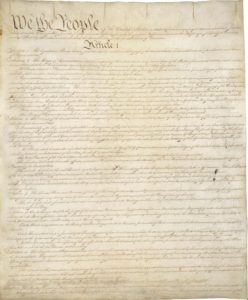Read This If: You’re looking for some interesting observations on scope, change management, and iterations as well as willing to consider that maybe some projects are not that tough, in perspective.
2009 seems to be moving right along! Was 2008 tough or not so much? Will 2009 be better or  worse? Are things sometimes LESS challenging than they appear?
worse? Are things sometimes LESS challenging than they appear?
The recent inauguration and oath of office that the US President takes has me considering just how small some project problems actually are. I was listening to a NPR story about the oath, and a few things jumped out (note that LISTENING to the podcast provides more than reading the article summary).
So where is the oath found? It is the last paragraph in Article II, Section 1 of the Constitution. It reads “I do solemnly swear (or affirm) that I will faithfully execute the Office of President of the United States, and will to the best of my ability, preserve, protect and defend the Constitution of the United States.”
Did you realize this is the ONLY sentence in the Constitution that is in quotes? Personally, I found it quite interesting that these were the only words in the Constitution that the writers believed should be specified. Most of the Constitution is not that detailed, according to Marvin Pinkert, executive director of the National Archives Experience.
On Iterations: Can you learn from George Washington? Clearly he is not teaching any classes anytime soon, but consider that the word “ability” evolved from “judgment” to “abilities” before finally becoming “ability”. There are notes from Mason and Adams related to changes they wanted in the oath. I find this interesting because today, we rarely think about the fact that there was an iterative process to developing the Constitution. There was give and take. People had to work together. Consider how complicated that process must have been when you are working on your next large project.
More or less all projects and tasks have some iterative component so saying Washington was on a Scrum team, is over the top perhaps (and yes, Scrum can work on non-software projects). There are always changes as work is reviewed. When working on a 100% pre-planned project, you are going to run into issues if you do not have a way to address change. Change is coming, one way or another!
On Requirements: Requirements are constantly changing and the ability to tweak words to adjust the meaning is never ending. It is important to do so, in order to to make the requirements, as they say, “consumable.” Consumable requirements are not to be used in a sandwich with mayo and pickles. Consumable requirements should be able to be used for their intended goal. The critical question: “who is the audience?” You may need multiple versions of requirements or prototypes for various audiences.
On Scope: As you can see, the words “so help me God” are not in the Constitution. Please note that I am not looking for a debate about whether they should be or not. From a strictly technical standpoint, I find it interesting that with only one specific sentence in quotes, the phrase is not included. So when was it used first? That is unclear. Some say Washington used those words, and others argue he did not. Likely an endless debate, and as Pinkert notes, since he does not have a tape of Washington’s inauguration, he does not know.
On Change Control: Looking at the Constitution overall, perhaps it has the strongest change control of any “solution” around? Going into effect on June 21st, 1788 (with New Hampshire’s ratification (89-79!)), there have only been 27 changes to it. Some of these however were quite large. For example the Bill of Rights, with those those basics like freedom of speech and religion, accounts for 10 of the 27 amendments made (ratified in 1791).
So change is allowed. The writers realized that they must allow for changes to take place. That said, the process is quite rigid. To amend the Constitution, two-thirds of both houses need to propose the amendment and three-fourths of all states must ratify the amendment (Article 5). That is tougher change control than most projects I run across!
A few questions to ask yourself:
Do you allow changes on your projects?
How rigid is your change control process? How rigid should it be?
Are you stifling change?
How do you account for natural changes and the flow of new ideas?
When is scope creep OK?
How do you handle iterations?
So how do I wrap this up? My point here is that sometimes we all need to consider stepping back and asking some questions about what we do everyday. Are we making things more complicated than they need to be? Are they actually LESS complicated?
Granted they had some heavy weight thinkers working on that project (the Constitution), but consider that the writers had to wrestle with these issues throughout the entire document, not just the oath! Keep in mind, this was all without the fanciness of cool terms and technology like stakeholders, computers, PMOs, agile, Scrum, IIBA, APLN, PMI, the Internet, Twitter, FaceBook, Linked In, Plaxo, and even NPR.
They got it done – can you?
Feel free to email me with questions, comments, or ideas for future blogs!











Hi Jake,
Nice post. You bring to bear the point that although so much has changed since the Constitution was ratified, so little has changed on a fundamental level. We can learn a lot from how our Founders approached change itself as well as the process they went through to deliver a work product.
On a somewhat related note, I’m in the middle of reading Ben Franklin’s autobiography. He focuses the better part of a chapter talking about how he learned to write, the lengths he went to improve his prosaic writing, and the benefits writing created for him throughout his professional and political career. I think if Franklin were alive today he might just be a blogger! Our tools change radically; fundamental aspects of being human and engaging other humans don’t change quite so much.
Keep on writing.
Laura
http://www.bridging-the-gap.com